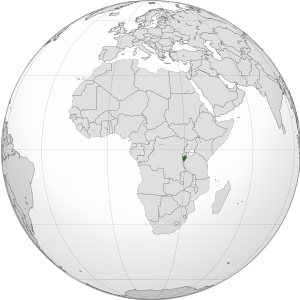More languages
More actions
| Republic of Burundi Repuburika y’Uburundi République du Burundi | |
|---|---|
 | |
| Capital | Gitega |
| Largest city | Bujumbura |
| Government | Unitary dominant-party presidential republic under an authoritarian state |
• President | Évariste Ndayishimiye |
• Prime Minister | Gervais Ndirakobuca |
| Area | |
• Total | 27,834 km² |
| Population | |
• 2023 estimate | 13,162,952 |
Burundi, officially the Republic of Burundi is an African country bordered by Tanzania, Democratic Republic of the Congo, and Rwanda. Burundi is a member of the African Union, and AFRICOM.
History
German colonial rule
From 1890, Germany colonized Burundi, which became part of German East Africa.[1]
Belgian colonial rule
Following the First World War, Belgium took control of the colony, until it gained its independence in 1962. The Belgian government carried out a program of kidnapping biracial children from Burundi, and then Belgium Congo during the 1940s and 50s.[1]
Independence
During the colonial era, the ruling powers strengthened the divide between the Hutu and Tutsi groups. This contributed to a deadly ethnic conflict between them in the 1970s and then another civil war for 12 years from 1993, which killed some 300,000 people.[1]
21st Century
In 2020 Burundi demanded that Germany, and Belgium to pay €36 billion ($42.6 billion) in reparations for colonial rule. The country also demands that colonisers return all of Burundi's stolen historical artifacts and archive material.[1]
References
- ↑ 1.0 1.1 1.2 1.3 Deutsche Welle (2020-08-19). "Burundi to Demand Colonial Reparations From Germany and Belgium" Black Agenda Report.


